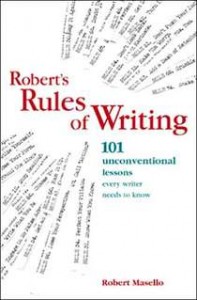Are you ready to work on your writing techniques? This book will help you do it in easy-to-swallow doses. Robert’s Rules of Writing is subtitled: “101 Unconventional Lessons Every Writer Needs to Know. On the back cover, there is a second subtitle: “But No One Has Ever Told You.”
Masello is a prolific professional writer, and he makes no bones about the fact that writing is work. Each rule is about two pages long, great for those of us with short attention spans. The first rule shocked me out of my socks: “Burn your journal.” After I recovered, I read on. “If you’re serious about writing—burn your journal and get to work.” His point is that journaling has its place, but, if you want to turn out publishable material, you have to plan, research, and organize as you write. Journaling might give you ideas, but it will not get your work published.
Every rule is useful, although some may go against what you have been taught. There is no “filler.” I read about half the book in one sitting. Then, I decided to read one every day to keep Masello’s “get real” advice uppermost in my mind. At first, I thought it was just for laughs, but he is serious about sharing with other writers the techniques and attitudes that have worked for him.
The book is not for beginners. In the introduction, Masello states that he assumes that you “know the basic principles already and that you don’t need a lecture on how to feel good about yourself.”
Check it out on Amazon. Sample the book using the “Look Inside” feature. Complete table of contents is shown, plus sample chapters.
Subscribers, what’s your favorite book about writing? Share it with us by commenting on this post.
How to comment (for e-mail subscribers).
- Click on the article title in your e-mail. This takes you to the post on Blog4Writers.
- Scroll down to the Comments box at the bottom of the post.
- Fill in the blanks.
- Answer the math question! I now use a comment spam prevention measure that has totally knocked out the spam I was getting. It’s called Math Comment Spam Protection. You’ll have to enter the answer to a math problem (like 8 + 8 =). No advanced math. Give it a try.










